Elise Christie
Elise Christie interview: “I probably use Instagram the most just because it’s a lot friendlier than Twitter – you tend to get a lot less abuse on there!”
2017 Short Track World Champion and 500m World Record holder Elise Christie talks about the ups and downs of social media in sport, and her plans leading up to Winter Olympics 2022 in Beijing.
Elise Christie
Elise Christie interview: “I probably use Instagram the most just because it’s a lot friendlier than Twitter – you tend to get a lot less abuse on there!”
2017 Short Track World Champion and 500m World Record holder Elise Christie talks about the ups and downs of social media in sport, and her plans leading up to Winter Olympics 2022 in Beijing.
“By next year I want to be World Champion again.”
Elise Christie ought to be exhausted, but she isn’t even breathing hard.
I’ve never interviewed someone on a static bike before (she is, I’m not) but Elise doesn’t seem to have a problem with it.
Okay, I suppose if she doesn’t, neither do I. At least that’s what I tell myself as we talk, even as my finger finds its way to my gut for an experimental prod – such is the effect of the elite athlete on the amateur and rather too-part-time fitness fanatic.
It probably goes without saying that there aren’t too many similarities between Elise Christie’s athletic prowess and mine. I’ve been keeping fit for longer than she has, uh-huh, but that’s only because I’m thirteen years older and her definition of keeping fit is not in the same dictionary as mine. You might want to try a different library actually.
Elise has that promising childhood history that must have said ‘Keep your eye on me’ every time she put on a pair of skates. And not just because she was fast on the ice: the Elise Christie we know today is as much a product of her character as she is her technical skating ability.
“Yeah, I started as a figure skater when I was about seven. Then when I was about fourteen years old I transferred over to short track – mainly because it was just a lot more suited to my personality to be honest. I was a bit more tomboyish and I’d rather go fast than dance around. It obviously wasn’t a very well known sport compared to figure skating, so I was just kind of lucky that it was in the rink that I was training in.”
In those early days, the days before Elise Christie claimed a trove of European medals that could sink a ship, before she became the first British woman to win a speed skating World Championship, before she broke the 500m world record, there wasn’t much in the way of a social platform from which to share her ups and downs.
Today, it’s a different picture. Actually, quite literally.
“I probably use Instagram the most just because it’s a lot friendlier than Twitter – you tend to get a lot less abuse on there!” she laughs. “And also, obviously, pictures tell quite a big story about things. It’s nice to see everyone else’s pictures as well but, yeah I think it’s a safer platform than Twitter.”
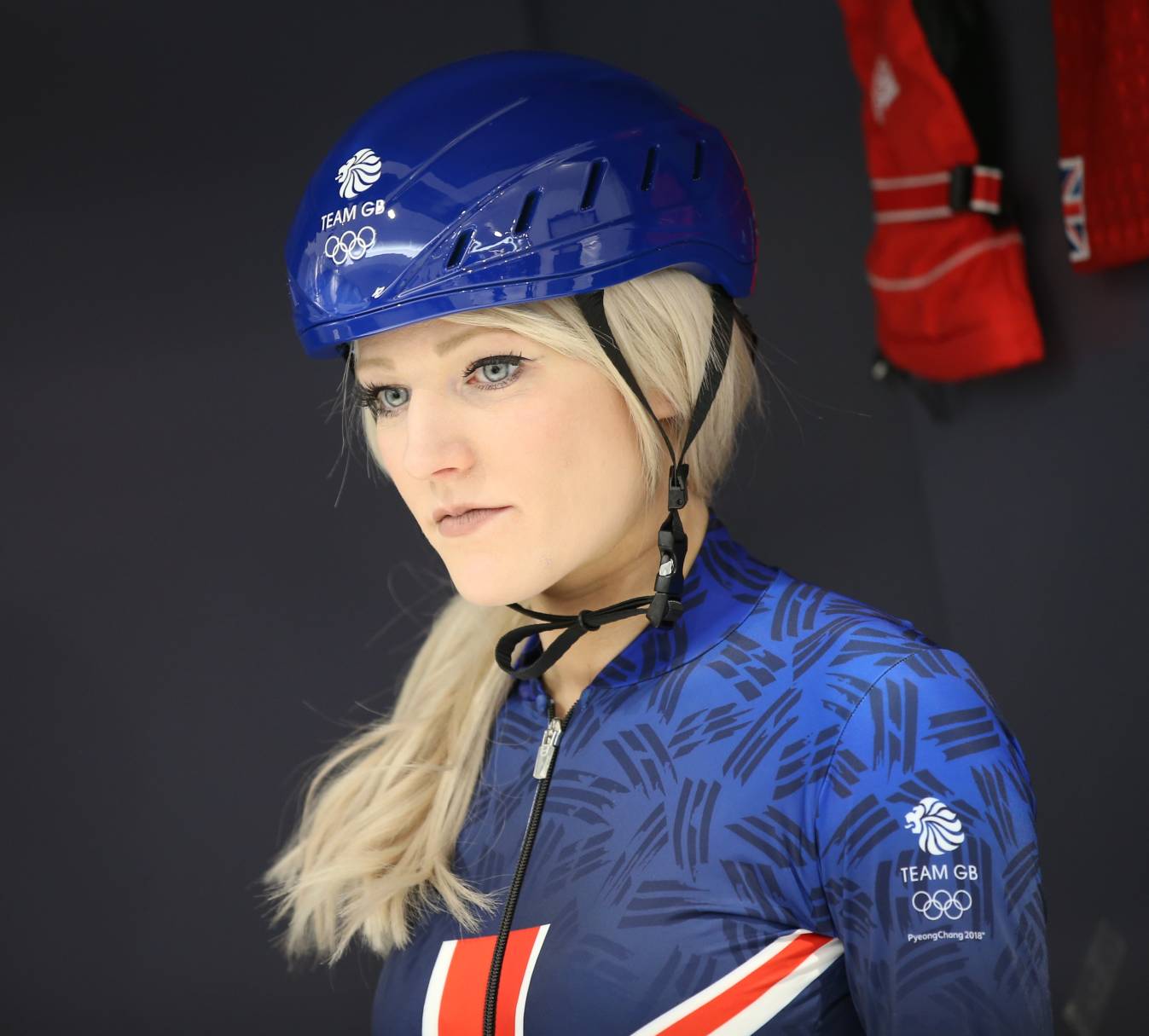
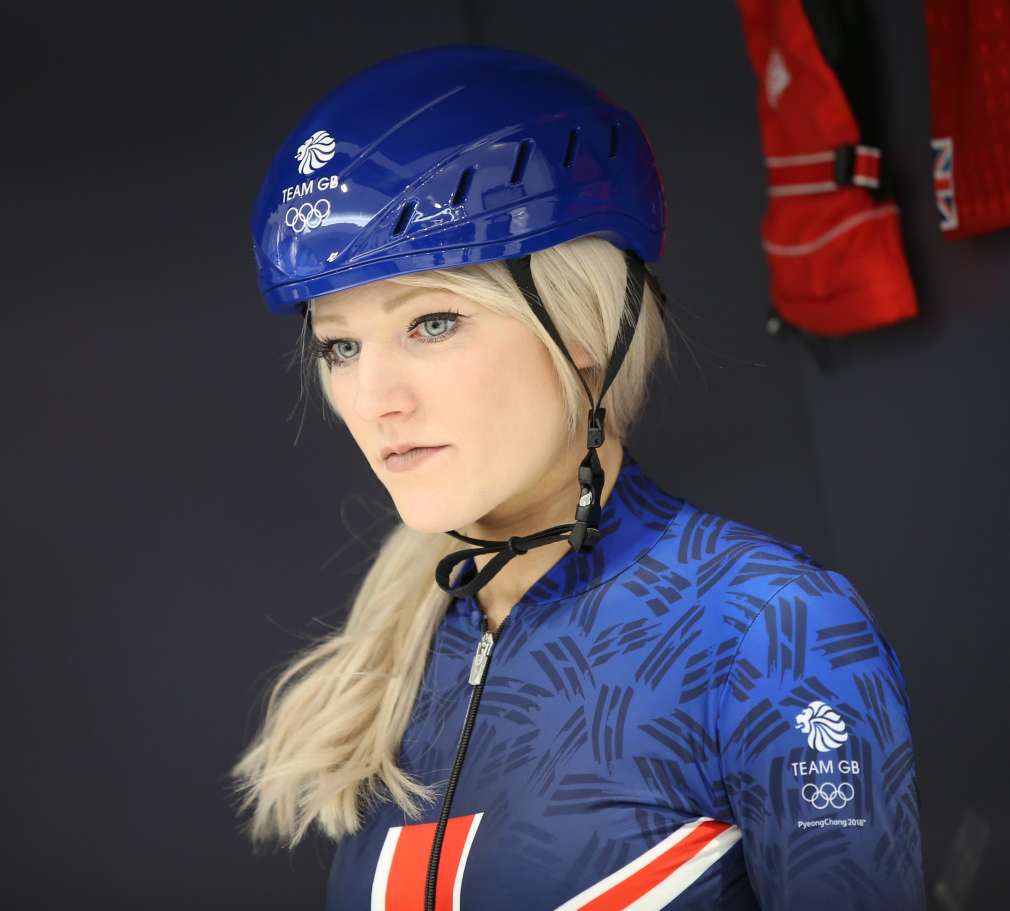
She’s right. Twitter is a harbour for opinions. A great place for a discussion or a debate, yes, but also for a downright row, and you should probably think twice about posting there if you’re not prepared to have the public vent at you from time to time. However: a scroll through Elise Christie’s recent tweets reveals a successive stream of support. I see a message of concern here, a gesture of compassion there, I see – ahh hell, one from yours truly two weeks ago that says ‘I’m gonna reply to this when I’ve not been drinking.’ Did I really say that? Damn platform. Regardless: the well-wishers are all present and correct, not to mention prolific. Elise might prefer Instagram (you can find the Elise Christie Instagram feed at the end of this feature) and yes there’s been a little bit of flack sent her way on Twitter, but her forty-two thousand-odd followers are, by and large, loyal.
“The followers that I have, they’re really supportive actually – I have a great bunch of followers on there and they generally stick up for me if anyone says abusive stuff anyway, so it is quite nice. And a lot of them have supported me for years now, it’s been a privilege to have them.”
It should be easy for a world-renowned athlete – actually any celebrity – to milk their social platforms every time a boost is required: you just read the nice comments and gloss over the nefarious ones, right? In fact, even a cursory glance at the Elise Christie Instagram feed reveals a plethora of well-wishes. And for some that’s a principle that works, but for a person – and a personality – like Elise Christie, the issue isn’t quite that scant.
“It’s a difficult one,” she says when I ask if today’s social world is better than the more discreet one of, say, fifteen years ago. “I still don’t feel like you can fully share your opinion – you can’t really argue back with the people who are putting you down or saying rude things, do you know what I mean? So there’s that side of it where, yes it’s good in some aspects because you are able to share some sort of opinion with them, but at the same time you’re open to a lot more of everyone else’s opinions than you probably would have been back in the day. So there are positives and negatives to it I guess.”
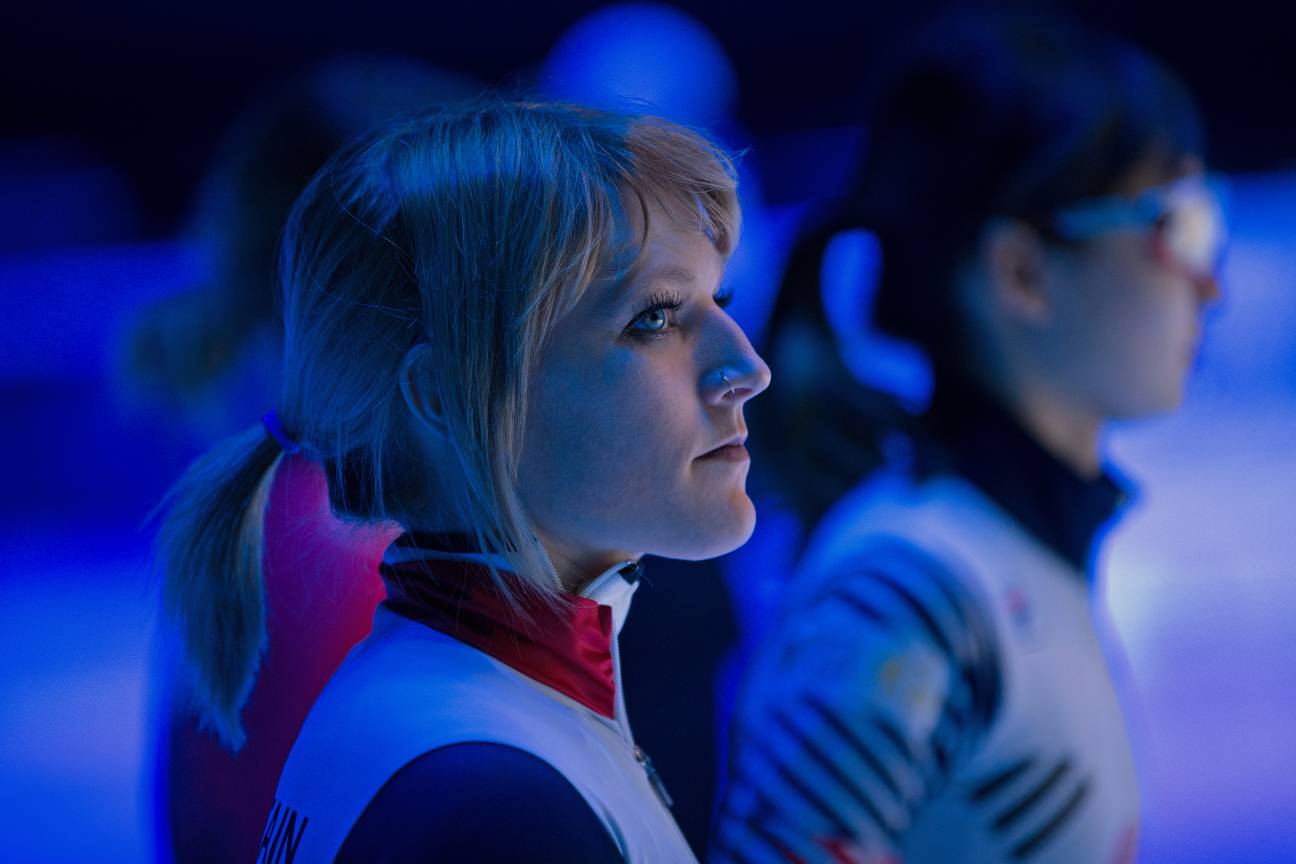
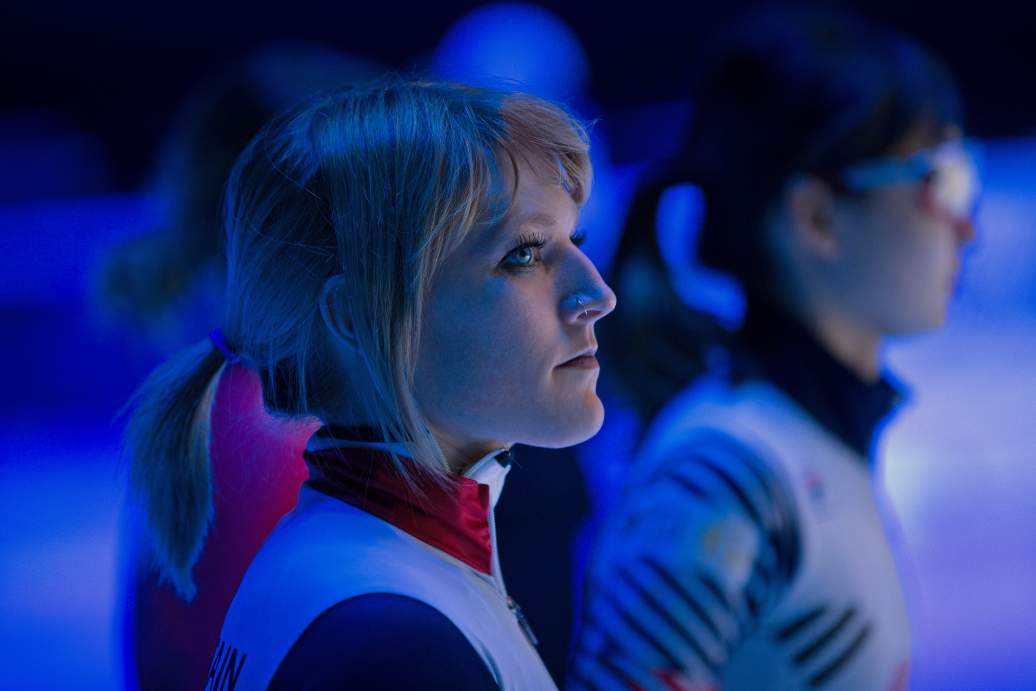
And with that Elise Christie makes an important point: the responsibility – or perhaps we should call it self-censoring – that is required of a recognised personality. Someone in Elise Christie’s position can’t just tweet the first riposte that jumps into her head, as much as she might like to, because she’ll be judged on those words by a crowd much larger than that of her accuser. It’s a bit unfair actually because if she swears at someone (I’m not suggesting she would) and the whole world hears – okay, reads – it, suddenly she’s the villain.
“Exactly, so I feel like sometimes it’s a lose-lose because if you argue back, some people don’t like that. And if you take it, then people think they’re right about their opinion – even if they don’t really know much about the sport. You see a lot of it with footballers as well, they get a lot of it. Some of the stuff people write is just like, ridiculous. If someone does it to me in the street I’ll argue back with them, do you know what I mean? But on social media you’ve got to behave a certain way.”
It’s true. While there are many who summon the most splenetic invective from behind the shield of a computer screen, those prepared to voice their opinions face to face are a rarer species.
“Yeah, I’ve only had a couple of people on the street actually do it whereas obviously, a lot of people have their opinion on social media. But,” she points out, “at the same time I do understand it. You know, I have opinions on things and I might not be right about all my opinions. But it is such a harsh platform – people are able to just say what they think without realising how that might impact someone.”
And as I listen to Elise Christie I begin to understand a bit more about the imbalance in all of this.
Come to think of it I’m starting to feel a little insecure at the lack of abuse I get on social media: I’m not known beyond the realms of my (albeit amazing) dedicated winter sports followers, whereas Elise Christie has transcended her arena in such a way as to draw attention from all quarters. It’s an honour, some kind of privilege at least. But in her shoes she can’t take all the praise without accepting some of the criticism, right?
“Yeah exactly, and I do agree with that, I agree that people have that right. I think that what’s wrong about it is that we’re expected to behave a certain way and they’re not, almost. It’s like, we’re still humans at the end of the day. And everyone’s equal. In fact if anything we’ve got it tougher because we’re going out in front of millions of people and doing something. So yeah I do agree, everyone has the right to their opinion and that’s fine but, it’s whether it’s necessary to be sharing abusive messages towards people when they’re just doing the best they can in the situation they’re in.”
Of course giving a hundred percent is pretty much the standard expectation on any athlete. Doing it when the body and emotions are turning against you, however, is another matter. It’s an element of the professional sportsperson that Elise understands very well: she has suffered for short track. She has been battered and broken – just look at the images all over the internet of Elise Christie on crutches and Elise Christie with leg in cast. The road to recovery and the return full strength has been long.
Elise isn’t naïve to the fact that when it comes to rehabilitation, the sturdiest crutch comes from her fan base.
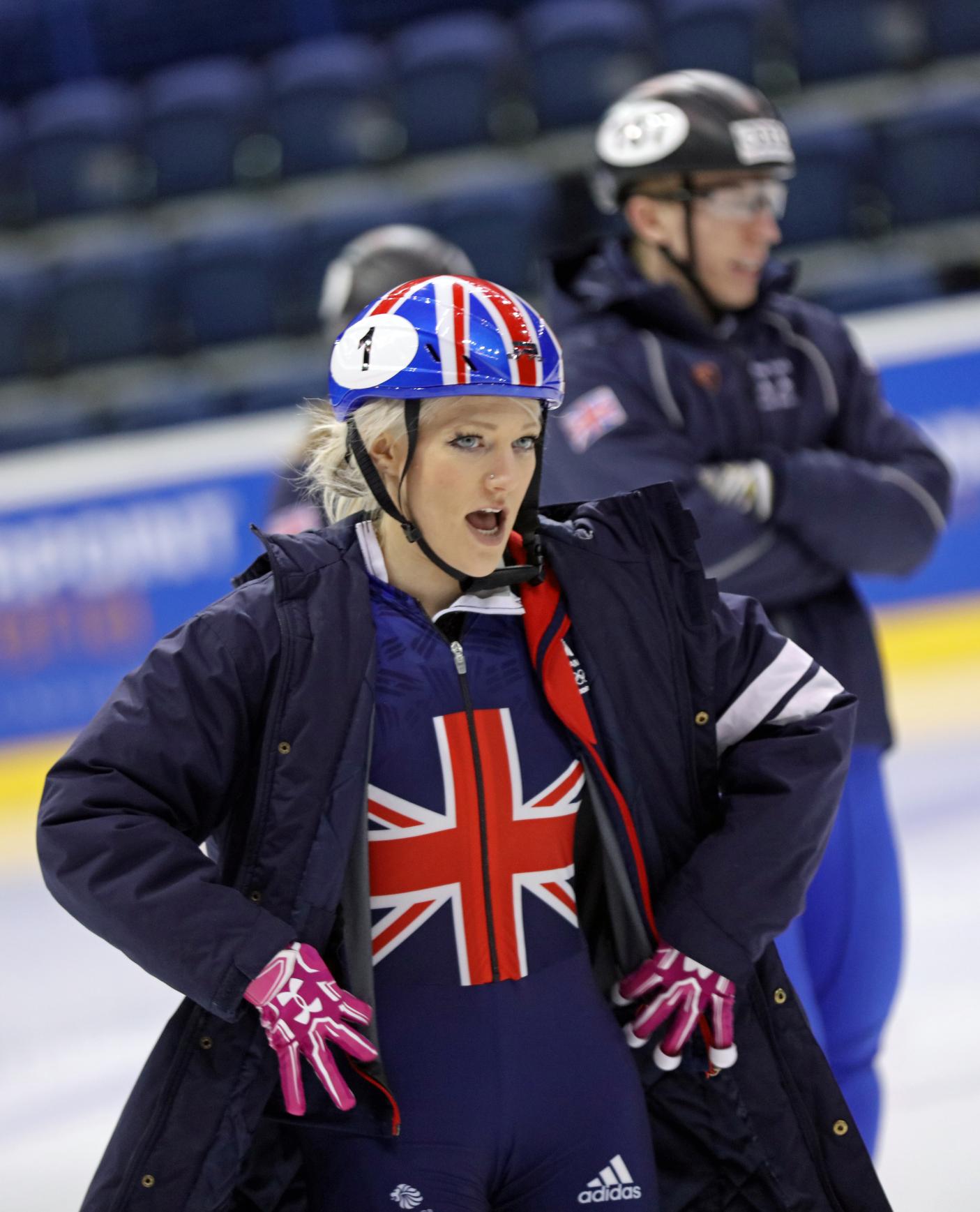
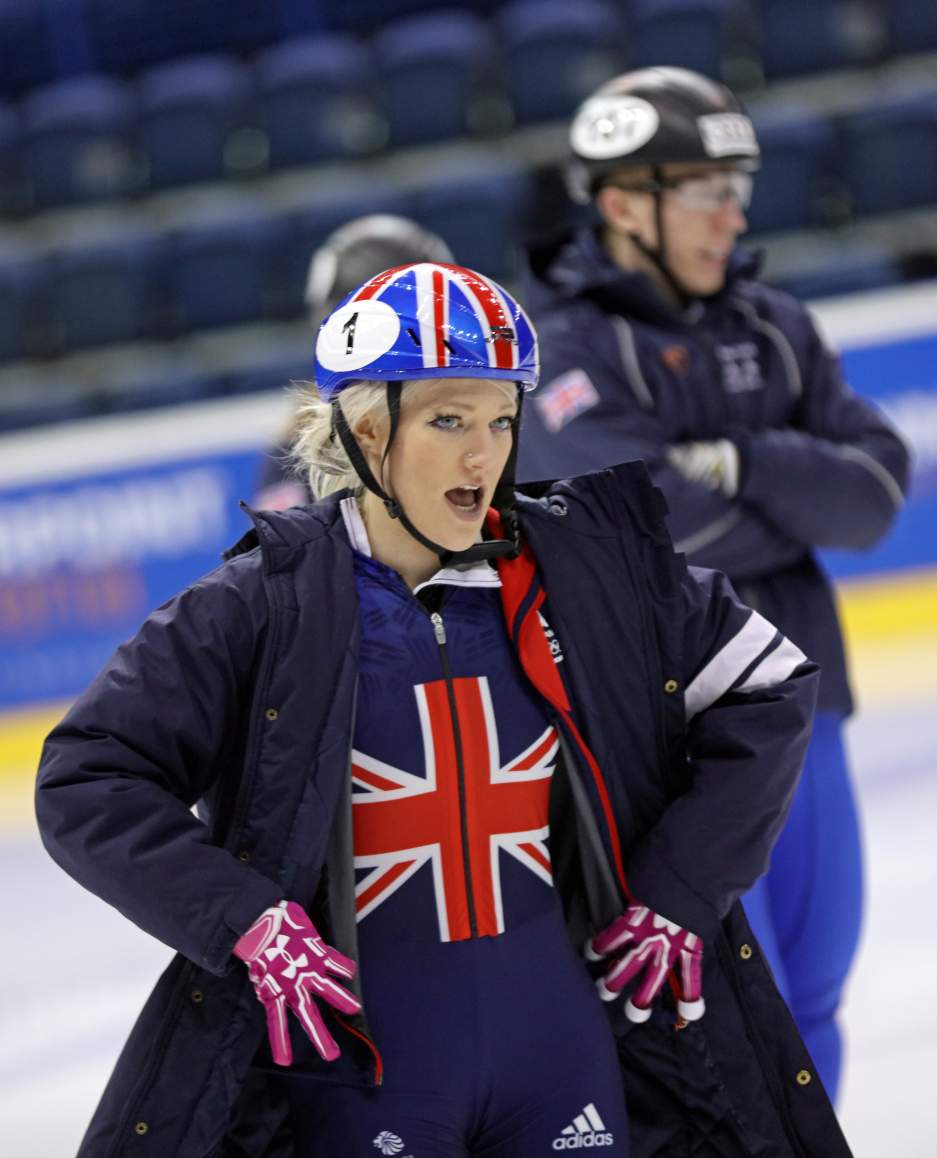
“Yes I think it definitely does, because people are always asking about that and wanting to know about it, and people are following me because they’re hoping I’m going to come back in four years and try again. So it has been an easy way for me to keep in contact. Mentally, it’s also been good for me to share that and get the positive feedback of course. I’m not going to lie – the public have made the last four years much easier for me because without them it would have been hard to find the motivation at points because it’s been so tough. So yeah there is that as a positive, where the people do keep you going sometimes.”
The same goes for the day-to-day tribulations. For Elise Christie a bad day at the office is public knowledge and while that compounds the pressure of competing, it also allows a window through which that same public can reach and in most cases, attempt to console. As with her injuries, when Elise is unhappy with her performance it is often the fans who pick her up.
“Yes, of course they do. I think most athletes will admit they’re really hard on themselves. Like we put ourselves down and we’re never happy with our performances and stuff like that so, to have external people who you don’t see day to day just making the effort to tell you how great you’re doing, or send you some positive messages, is like one of the best feelings in the world. That’s one of the best things about being an athlete you know? So yeah, that side of it is really nice.”
Social media is going from strength to strength, and any kind of stasis in its impact on modern society seems a long way off.
But it is also evolving.
There was a time when the likes of Twitter, Facebook and Instagram were the collective sine qua non of any and every business – even the business of competitive sport. Seminars on social media would instruct businesses to get on the social media bus, or fail.
While the evolution of social media didn’t turn out to be quite so cut and dry, nobody can argue its influence in today’s channels of communication. Social media is a powerful tool and it can have a stark impact on those who wield it. It must be used with caution, even if it is supposed to paint a picture of familiarity. In other words, think before you post.
“I’m pretty much very honest with everything that I write, but yes there is an extent where you have to think before you post, for sure. You know, if you’re having a really bad day and you get this rubbish Twitter post through, it’s the last thing you need on a day like that. Like, I can see why people make mistakes in those situations and post the wrong thing, and then everyone turns around and jumps in without knowing what’s going on in that person’s life. They think that because they follow them on Twitter and Instagram they know everything that’s going on with them. I had a lot of stuff going on in the year of the Games, and going into the Games that happened while I was out there, that people weren’t aware of that affected how I performed out there, but obviously people just jumped to the whole, ‘Oh it’s too much pressure, she can’t cope’. And I’ve never been able to tell that story because at the end of the day it’s not the right attitude to just blame things and act that way. You know, I had to do my best on the day and that was all I had. It’s like, I kind of want to share what actually happened but it’s probably best not to, because you need to stay professional.”
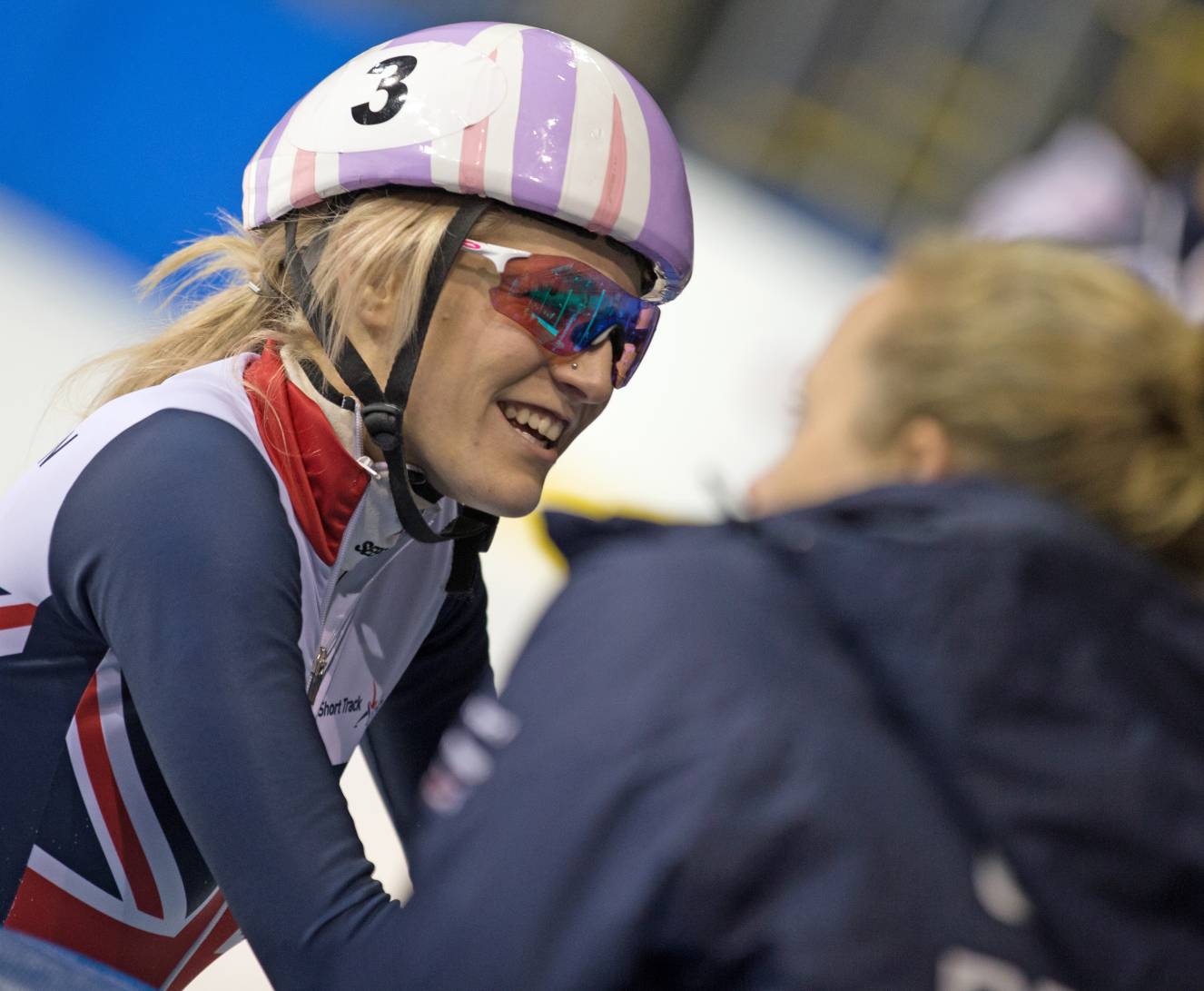
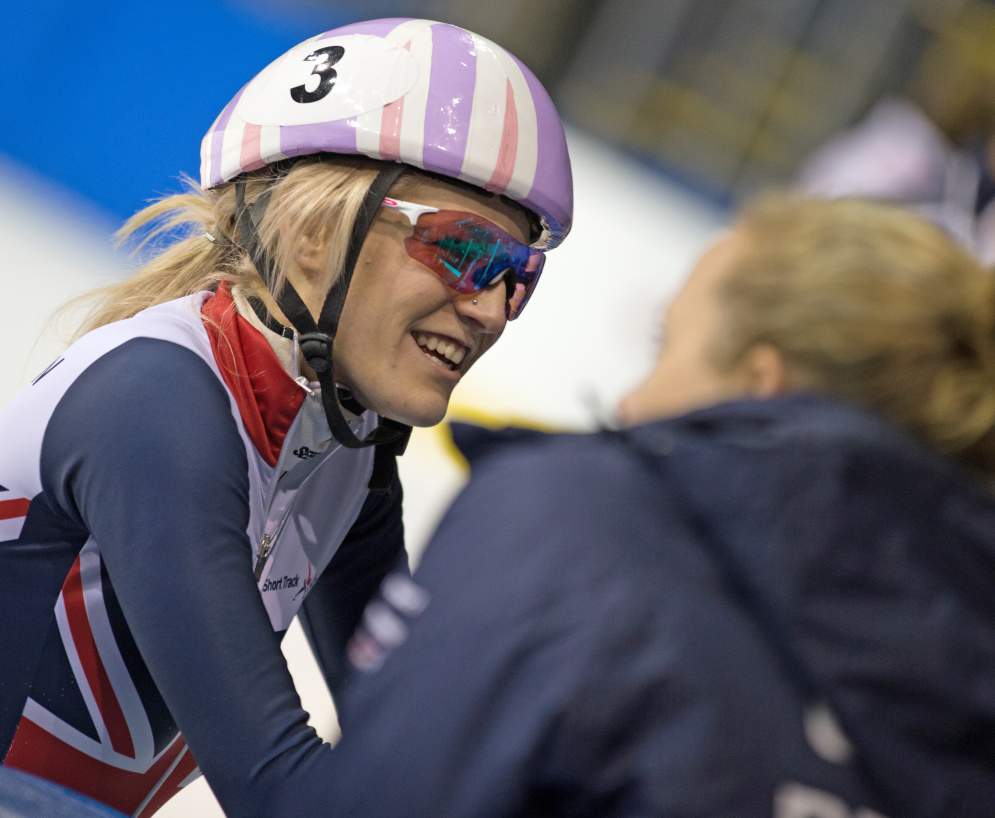
I want to ask Elise to elaborate on what it is that everyone doesn’t know. Because everyone likes a scoop, right? But then I will betray the point of this interview, which let’s face it is to explore just how personal an athlete’s personal life really is. Not to mention I’ll be overlooking everything she has just told me.
So I don’t. Because I’m finding that Elise Christie is a sports personality in every sense, one who conducts herself honourably. It would be nice if she could expect the same in return, at least from me anyway.
In fact Elise has been setting a good example for some time now.
Most casual sports fans will recall the heartbreaks of Sochi and then Pyeongchang, but actually South Korea was her third Olympic appearance and she has been winning medals on the short track circuit since 2010.
Not only that but Elise has been on the end of some questionable (yeah okay I’m a bit biased) umpire decisions and she’s been bashed and bruised more than once. She has picked herself up and not just slogged on, but slogged her way back to winning form. Not surprisingly, when I ask what advice she would give to someone looking to get into short track, Elise counsels a very specific mindset.
“You have to be able to deal with spontaneous decisions! Short track is a bit mad, and it is unpredictable and you have to be able to cope with that. You could easily be the best skater in the world and not win anything in one year because you just get unlucky and fall over and stuff like that, you know. But I think that’s part of the excitement and challenge of it, like when you win, you’re like – you can’t believe you’ve won, you know? You’ve got so many things right and nothing’s gone wrong and you’ve managed to win. It’s one of those sports where if you really like to challenge yourself and you really like excitement and speed then definitely I’d say give it a go. But,” she says, laughing the way one can only from deep personal experience, “if you can’t deal with unpredictability, then I wouldn’t say it’s for you!”
She’s right about the unpredictability element of short track speed skating. Any sport where you go shoulder to shoulder with your competitors adds another dimension to the crash-risk.
Also, though, to the spectator value.
Ten-times X Games Snowboard Cross champion Lindsey Jacobellis told me that the factors outside of her control are what makes hers such an exciting sport to watch. And like snowboard cross, short track speed skating is essentially a contact sport, the potential for collision looming ever present in both.
“Yes exactly, it’s very similar in those senses for sure and it gives you that adrenaline. I think it’s a sport that isn’t practiced enough in the UK and there’s a lot of opportunity for talent that we’re missing.”
But even with everything Elise Christie tells me – of the injuries and the judgements and the questionable decisions – I don’t think her words will do anything to discourage the future crop of short track speed skaters: after all there is a wealth of young athletes out there who love the special formula of adrenaline that comes only from racing alongside your opponents, the buzz of your nearest competitor quite literally breathing down your neck.
Despite her recent injury and recuperation period though, Elise Christie is still a long way from handing the reins over to the next generation of racers. There is a plan and yes, it involves speed skating and yes, it involves Beijing 2022.
“Well because of my injury and coming back from that, I won’t be racing until February. The team will be racing at the end of October so I’ll be missing four world cups and Europeans, but hopefully I can get back for the last world cup. I’d say I’m trying to get into the top eight, because I have had a bad year of injuries. I’ve had more injuries than just what was from the Games so I had to rehab everything, and now I’m pretty much in full fitness again. Which is good, but I’d say this year just try and get, sort of, top eight and then by next year I want to be world champion again. So I’m more focused on the year after and the years going into the Games now.”
That’s right, you did hear an Olympic goal there. Which, I suggest to Elise, is something the public must be very happy about.
“Yes, everyone’s been really lovely about it. I think even the people who hate me want to see me there!”
She laughs at that notion but perhaps it proves a point: that an athlete needs just a little bit of bad feedback from the public. Ninety-nine percent positive, yes, but how about a pinch of friction to spice things up a bit? A bit of good, a bit of bad – that’s entertainment for you, surely?
“Exactly!” she says.
I leave Elise to finish her ride and her apparently ceaseless commitment to the cause: to the objective of Olympic gold. As far as I can tell, she isn’t breathing any harder now than when we started talking.
Social media will continue in its relentless pursuit towards the domination of modern-era communication. It will praise and it will chastise; it will enlighten as much as it will expose.
Whatever it does, Elise Christie will continue in her equally relentless pursuit of the one title that has evaded her.
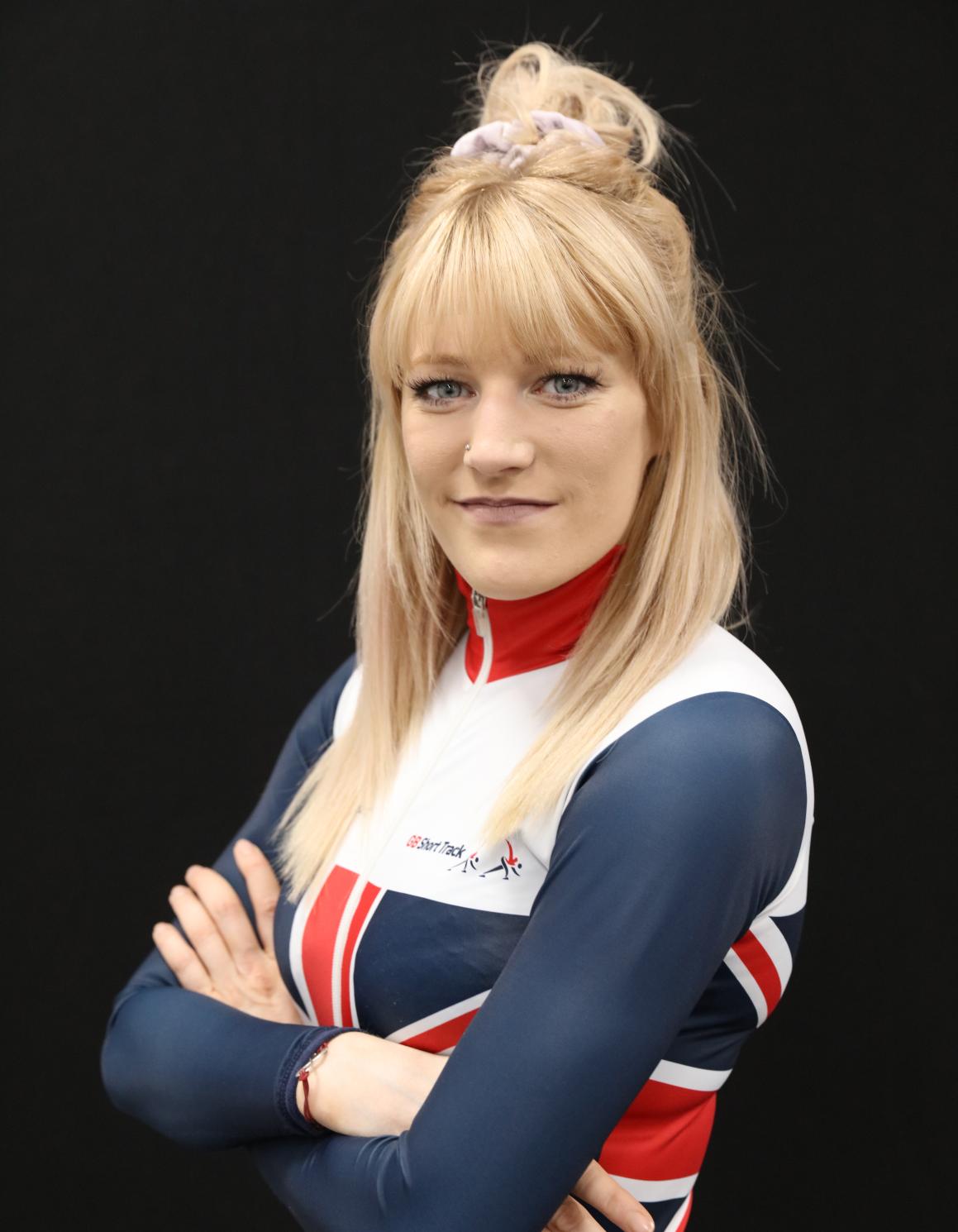
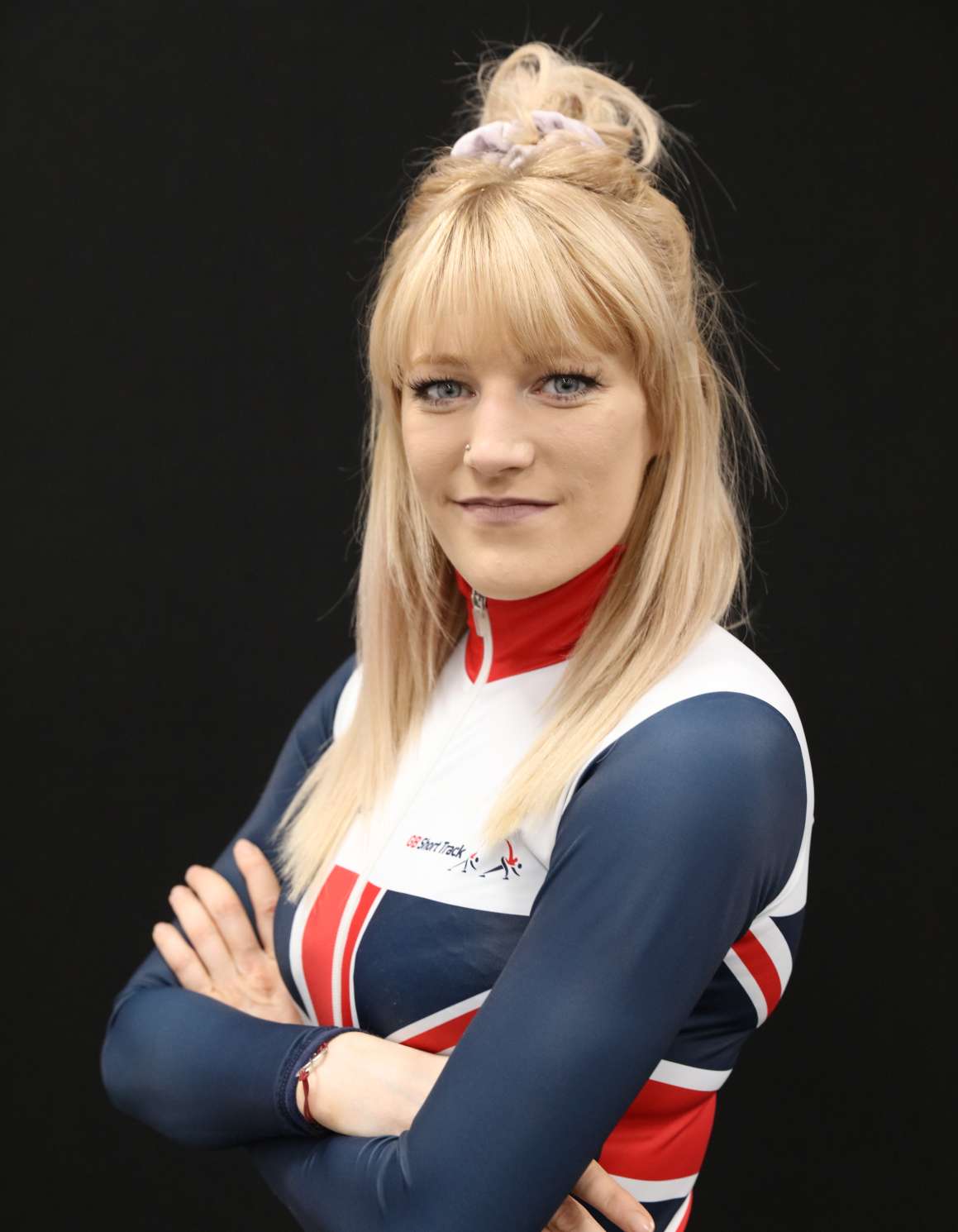
My thanks to Elise Christie for her time and for fitting me in mid-training! Thanks also to Jake Samuel at Octagon for his assistance in setting up the interview and for the images.
You can keep up with Elise Christie on her quest to return to World Champion position and her aims for Winter Olympics 2022 in Beijing at the following:
Elise Christie Instagram: @elisechristielikescake
Elise Christie Twitter: @Elise_Christie
Elise Christie Facebook: /EliseChristie13
Related article: Julia Mancuso
